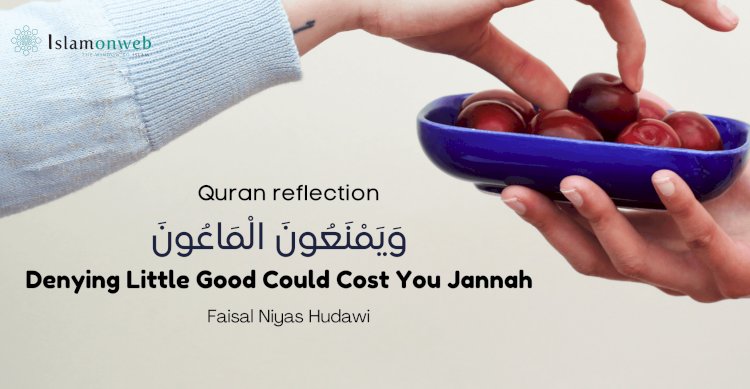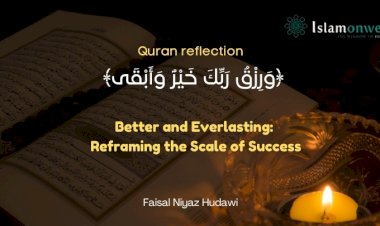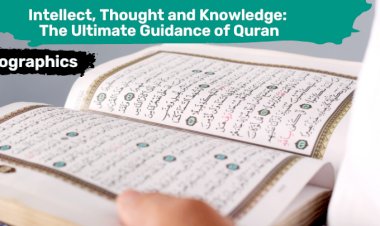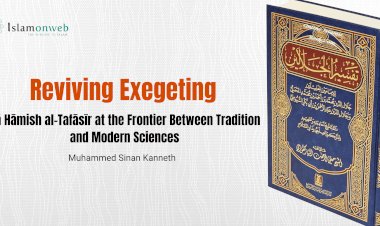وَيَمْنَعُونَ الْمَاعُون : Denying Little Good Could Cost You Jannah
Reflection on Surah Al-Mā‘ūn | Verse 7 — وَيَمْنَعُونَ الْمَاعُون
In just seven short verses, Surah Al-Mā‘ūn delivers a piercing critique of hollow religiosity — the kind that lacks compassion, sincerity, and social responsibility. The Surah opens with a powerful question:
أَرَأَيْتَ الَّذِي يُكَذِّبُ بِالدِّينِ
"Have you seen the one who denies the Judgment?" (107:1)
From this starting point, Allah paints the character of those who reject accountability in the Hereafter, highlighting their callousness towards the most vulnerable — the orphan and the poor. Their prayer, though performed outwardly, is devoid of heart, purpose, or humility. It is neglected, delayed, or performed for show, with no inward sincerity.
This Surah teaches us that faith without compassion is an empty shell. The one who denies the Day of Judgement lives selfishly, devoid of social conscience. True believers, in contrast, manifest their faith through action — caring for others, offering support, even in small ways.
In a time when acts of kindness can be as simple as forwarding helpful information, checking on a neighbour, or sharing knowledge, the question we must ask ourselves is: Are we withholding our Mā‘ūn? Or are we living the spirit of faith by giving, sharing, and serving?
The Surah concludes with a sharp indictment:
وَيَمْنَعُونَ الْمَاعُونَ — “And they withhold [even] small acts of kindness.” (Al-Māʿūn 107:7)
This closing verse seals the Surah’s message by exposing a fundamental flaw in the heart of the one who denies the Last Day — the refusal to offer even the smallest benefit to others.
The word “Al-Māʿūn” comes from “Maʿūnah” (معونة), meaning assistance or help. It refers to anything by which others are aided, such as tools, utensils, water, or even a simple favour. As Ibn Masʿūd explained, “It is what people commonly share among themselves, like a pot or an axe.” These are not major acts of charity, but everyday kindnesses — the kind that build community and soften hearts.
Imam Ibn Kathīr noted:
“They neither worshipped their Lord properly, nor did they treat His creation well — not even by lending what is typically returned to them. If they withhold even such things, then withholding zakah and other obligations comes even more naturally to them.”
In his Tafsīr, Imām al-Qurṭubī brings together twelve different views about the meaning of “Al-Māʿūn”, showing the richness of scholarly reflection on this verse:
- Zakāh (Obligatory Charity): This was the view of Ibn ʿAbbās, ʿAlī رضي الله عنهما, and Imām Mālik — that the hypocrites are described here for withholding the zakāh due on their wealth.
- Wealth in General: According to Ibn Shihāb and Saʿīd ibn al-Musayyib, the term refers broadly to wealth, especially in the language of Quraysh.
- Shared Household Items: Ibn Masʿūd and Ibn ʿAbbās also interpreted al-māʿūn as commonly shared items like pots, axes, and utensils — simple tools that people normally borrow and return.
- All Beneficial Things: According to al-Zajjāj, Abū ʿUbayd, and al-Mubarrid, al-māʿūn in pre-Islamic times referred to any item of benefit, big or small, while in Islam it came to signify acts of obedience and zakāh.
- Borrowed Items (ʿĀriyah): Some said it refers specifically to items lent to others for use, such as tools or utensils.
- All Good Deeds and Known Kindness: Others, like Muḥammad ibn Kaʿb and al-Kalbī, saw al-māʿūn as encompassing all acts of known goodness and kindness.
7-8. Water and Pasture: Some opinions narrowed it to water and pasture (essential resources) or water alone, considered the most basic of communal needs.
- Withholding Rights and Due Help: As per ʿAbdullāh ibn ʿUmar, it refers to those who withhold people’s rights and do not help when required.
- Small Benefits (Al-Maʿn – the Little Things): Some derived al-māʿūn from “maʿn”, meaning small amounts or little acts, implying that even the smallest help should not be withheld.
- Obedience and Cooperation: In Arabic usage, al-māʿūn also referred to obedience or yielding, showing the spirit of helpfulness.
- Basic Necessities (e.g., Water, Fire, Salt): Based on a ḥadīth of ʿĀʾishah, some said it refers to basic resources that should never be denied, such as water, fire, and salt. The Prophet ﷺ said: “Whoever gives water, it is as if he has freed sixty slaves...” [Reported with some weakness, but conveying a deep meaning].
Imām al-Qurṭubī concludes that the most deserving of this blame are the hypocrites, because they combine three shameful traits:
- Neglect of prayer,
- Riyāʼ (showing off in worship), and
- Withholding goodness from others.
Even if some of these traits appear in a Muslim, he is warned and rebuked to the extent of his neglect — especially if he refuses acts of kindness when urgently needed.
In essence, withholding Māʿūn reflects a heart devoid of empathy, incapable of compassion or social responsibility. Such a person is not just stingy with wealth, but with goodness itself.
The message for us is profound:
➡️ Faith is not only in ritual prayer; it must shine through our dealings with others.
➡️ Even small acts of kindness count heavily in the sight of Allah.
➡️ The Prophetic way is to offer, assist, and ease the burdens of others — with words, deeds, and even a smile.
Do Not Belittle Any Act of Kindness
The Prophet ﷺ advised Abū Dharr رضي الله عنه saying: “Do not belittle any act of kindness, even if it is meeting your brother with a cheerful face” (Muslim).
This hadith carries immense significance, as it encourages believers to embrace all forms of good, no matter how small they seem. The term maʿrūf refers to everything deemed good by the Sharīʿah, which includes countless righteous deeds that one can either perform directly or assist in—through wealth, counsel, family, or means.
The Prophet ﷺ firmly prohibits believers from underestimating the value of any good deed, whether major or minor, since Allah loves all acts of kindness, both great and small. It is possible that a person’s salvation may rest in a seemingly trivial act—such as the Prophet’s ﷺ words to ʿAdiyy ibn Ḥātim رضي الله عنه: “Protect yourselves from the Fire, even if only with half a date; and if you cannot find that, then with a kind word” (Bukhārī and Muslim).
Moreover, small deeds may carry immense weight with Allah depending on the sincerity of intention and circumstances surrounding the action. As ʿAbdullāh ibn al-Mubārak رحمه الله remarked, “A small deed may be magnified by intention, and a large deed diminished by it.” A deed may also be elevated if it represents the full capacity of the doer or if it was done despite personal need. Acts done in times of hardship, or towards those in severe need—especially if they are close in relation—are especially significant. This is captured in the words of Allah ﷻ:
فَلَا اقْتَحَمَ الْعَقَبَةَ وَمَا أَدْرَاكَ مَا الْعَقَبَةُ فَكُّ رَقَبَةٍ أَوْ إِطْعَامٌ فِي يَوْمٍ ذِي مَسْغَبَةٍ يَتِيمًا ذَا مَقْرَبَةٍ أَوْ مِسْكِينًا ذَا مَتْرَبَةٍ
(“But he has not attempted the uphill path. And what can make you know what the uphill path is? It is freeing a slave, or feeding on a day of severe hunger, an orphan of near relation, or a needy person in misery.”) [Al-Balad: 11–16].
Thus, every act of goodness, no matter how small, can become monumental in the sight of Allah, depending on one’s intention, effort, and the context in which it is performed.
The Prophet ﷺ narrated a profound story of compassion and mercy that reveals the weight of even the smallest acts of kindness.
Abū Hurayrah رضي الله عنه reported: The Messenger of Allah ﷺ said: “While a man was walking along a path, he became extremely thirsty. He found a well, descended into it, drank, and then came out. He then saw a dog panting and eating the moist soil out of thirst. The man said to himself, ‘This dog has suffered from thirst just as I did.’ So he descended into the well again, filled his shoe with water, held it in his mouth, climbed back up, and gave the dog water. Allah appreciated his deed and forgave him.” The Companions asked, “O Messenger of Allah, is there a reward for us in animals?” He replied, “There is a reward for every living being with a moist liver.” (Agreed upon – Bukhārī and Muslim).
This narration ties directly into the theme of today’s reflection on small acts of kindness (al-maʿrūf) and the meaning of “They withhold al-māʿūn” (Sūrat al-Māʿūn: 7). The man’s action was simple, driven by empathy and compassion for a creature of Allah. Yet, in the divine scale, this small deed carried such weight that it earned him forgiveness. This illustrates the immense value of good deeds, even those we consider minor—like quenching the thirst of an animal or greeting a brother with a cheerful face.
Such moments, while easy to perform, are precious in Allah’s sight, and as the Prophet ﷺ taught, “Do not belittle any act of kindness.” The road to Jannah is often paved with these seemingly small deeds that are sincere, timely, and filled with mercy. We conclude with conviction: Jannah is covered with small acts that weigh heavy in the scales of Allah. Let us never underestimate the power of kindness, for in every merciful gesture lies the potential for divine reward.
Even the Smallest Courtesy Counts:
Islam emphasises that no act of kindness or courtesy is insignificant. Through seemingly simple gestures—like making room in a gathering, greeting with salām, or including others in conversation—one not only preserves the dignity and emotions of others but earns immense reward from Allah. The following hadiths illustrate how everyday interactions, often taken for granted, carry weight in the sight of Allah and are essential in building a compassionate, harmonious society.
Abū Hurayrah (رضي الله عنه) reported: The Messenger of Allah ﷺ said,
“A Muslim has six rights over another Muslim: When you meet him, greet him with salām; when he invites you, respond; when he seeks your advice, advise him; when he sneezes and praises Allah, say ‘Yarḥamuk Allah’; when he is ill, visit him; and when he dies, follow (his funeral).” (Saḥīḥ Muslim)
These rights embody daily acts—greeting, advising, visiting—that are easy yet highly rewarding. They nurture love and community. Paradise is indeed surrounded by such acts that weigh heavy with Allah despite their simplicity.
Ibn ‘Umar (رضي الله عنهما) reported: The Messenger of Allah ﷺ said,
“Let no man make another stand to take his seat. Rather, make space and widen the seating.” (Mutafaqun ‘Alayh)
Ibn Mas‘ūd (رضي الله عنه) reported: The Messenger of Allah ﷺ said,
“If you are three, let not two of you converse privately excluding the third, until you mingle with other people, for that will grieve him.”
(Mutafaqun ‘Alayh; wording from Muslim)
These gestures may seem minor but are rich in reward and show the beauty of Islamic manners in everyday life.
As we reflect on this, ask yourself:
Do I share what I can with others, or am I holding back?
Is my faith seen in how I help and serve those around me?
Small acts, great rewards: Never underestimate even the simplest deed—a smile, a kind word, a helping hand. In the sight of Allah, these can be the reason for forgiveness and Jannah.
Mercy to all creation: Islam teaches us that compassion extends beyond humans to all living beings. Every act of mercy, even to an animal, carries reward: “In every moist liver is reward.”
Barriers to Jannah: Withholding small kindnesses (al-māʿūn) like basic help or sharing can reflect a heart hardened to goodness, risking loss in the Hereafter.
The Divine Scale: Deeds are weighed not by size but by intention and sincerity. What seems little to us may be monumental in Allah’s scales.
Seize the moments: A fleeting opportunity to show kindness may be a gateway to eternal reward. Don’t miss it.
Let’s walk the path to Jannah paved with small, sincere acts of goodness that transform hearts and weigh heavy in the balance. Let’s not be of those “who withhold Māʿūn” — for even a simple act of lending, a kind word, or a helping hand may be our way to Paradise.
More related articles:
A Universe of Signs: Don't Miss the Message
Behold! Perhaps Allah Will Bring Forth Something Better for You
Spreading the Blessings of Allah
Disclaimer
The views expressed in this article are the author’s own and do not necessarily mirror Islamonweb’s editorial stance.
























Leave A Comment